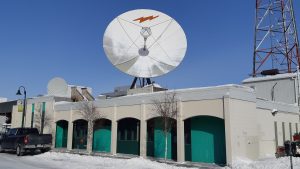A consortium of Indigenous communities from the three territories has purchased Northwestel for $1 billion, in a deal said to advance Indigenous self-determination through ownership of critical telecommunications infrastructure in the North.
Sixty North Unity, as well as Northwestel and Bell Canada announced the deal on Tuesday.
Darrell Beaulieu speaks for the NWT in the Sixty North Unity consortium.
“This collaboration across all three territories will allow us to own and operate a leader in northern telecommunications services and is the next logical step in the development and growth of our businesses.”

A dish atop a Northwestel facility in Yellowknife. (CKLB file photo.)
Bell will maintain a strong and strategic partnership with Northwestel beyond the transaction close through ongoing operational support, and as Northwestel’s largest customer.
The group will invest $4 million to build the Great Slave Lake Fibre Project, bringing resiliency to the Yellowknife capital and South Slave regions of the NWT.
“The acquisition will provide Indigenous communities with greater access to long-term stable cash flows to reinvest in the critical areas of community infrastructure, housing, social services, health, and education programs for those that live and work in the North,” reads a release.
Sixty North Unity is planning to double the internet speeds to 1 Gbps (gigabits per second) for fibre customers, expand high-speed Internet in the Yukon and the NWT, and offer Low Earth Orbit satellite technology to deliver faster speeds to eight satellite-served communities in the Northwest Territories.
This will help safeguard against the impacts of wildfires, natural disasters, and acts of vandalism.
No layoffs are anticipated, but the Sixty North Unity group intends to increase Indigenous representation in the workforce, in part through expanded training and mentorship programs.
Northwestel’s corporate headquarters will remain in Whitehorse, with the operational headquarters remaining in Yellowknife, and the regional office in Iqaluit.




